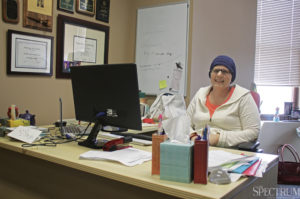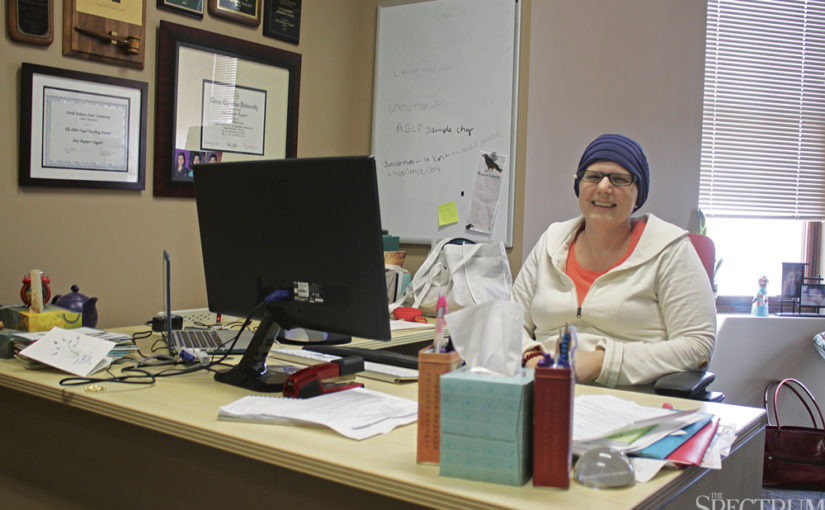Pushing through the pain and other pithy phrases about striving in the face of adversity usually apply to athletics, not academics. But sometimes that distinction doesn’t matter.

Even after her diagnosis of stage IV cancer, Amy Taggart plans to continue her work at NDSU.
Amy Taggart, a professor in NDSU’s English department, was diagnosed with breast cancer in 2012, and after a temporary reprieve, found out in late 2016 that the cancer had spread to her spine.
“The cancer filled up my vertebrae, and eventually seven of them broke, and are likely still broken to some degree right now,” Taggart noted. “Although the pain is more manageable, after a brief stint in a brace that made me look like Wonder Woman, and since the doctors injected some sort of cement to stabilize my vertebrae.”
Although Taggart’s cancer is terminal, the exact timeframe is an unknown.
“When my treatments initially weren’t working, my doctor told me I had months to years, which was sobering, to say the least,” Taggart said, “but now that treatment is going a bit better, it looks like I might be closer to the normal range of three to four years, but the truth is, it really depends. Some people live for 10 years, 15 years.
“I’m living day by day,” Taggart said. “I’m not dying tomorrow, but it’s out there somewhere. And it does change things — my first job is living now. I’d like to be doing my ‘second job’ at the university a bit more, but I’m doing what I can at the moment.”
Perseverance, dedication
Last semester, during the initial stages of discovering her illness had returned and pursuing treatment, Taggart continued to fill her role on campus.
“Amy’s dedication to her students is amazing,” Sam Hamernick, a senior in English, said. “Even with everything she was going through, even with a broken back, she showed up to class every day to teach us last semester.”
However, Taggart’s impact isn’t limited to the classroom. Advising and mentoring has a significant impact on her students.
“I have so much to say, but it’s hard to put into words how great Amy is — she basically changed my career path and got me into the community doing the work I do. I owe most of my success to her,” Hamernick noted.
Taggart’s work also filters out into the community. She incorporated the New American Consortium for Wellness and Empowerment into the curriculum for one of her writing classes. Students interviewed community members who arrived in the area as refugees, and helped develop a package of stories and information about corporate giving and volunteering by area businesses.
“Amy is a creative and passionate woman — working with her and her husband Mark is a wonderful experience for me personally, and for the Consortium,” Darci Asche, director of development for the New American Consortium, said.
In addition to her work teaching, Taggart has been instrumental in developing programs in the English department.
“Amy was a central voice in developing the major, the writing programs and the doctoral program. In part due to her work, the writing program and its assessment just won our campus’s award for program assessment,” Betsy Birmingham, professor and chair of the English department, said.
Disruptions, transitions
While illness disrupts the stability of daily life, it also brings with it opportunities for transition and change. Taggart directed NDSU’s first year writing program for five years, before her first experience with cancer disrupted her work in the position.
“It was a bit of an existential crisis for a while — if I wasn’t a writing program administrator, what was my role in the institution?” Taggart said. “And so I had to find a new pathway, but it was generative since I started doing general education work at NDSU and got involved with a bunch of people around campus.”
This work eventually led to Taggart becoming the Associate Director of the Office of Teaching and Learning. As part of her work there, she also helped write a National Science Foundation grant, which got funded at $2.6 million to help train faculty in the STEM disciplines to become better teachers.
Existential crisis or not, the work Taggart did while directing first-year writing isn’t taken for granted, especially by the current director of first-year writing.
“The job is manageable and enjoyable largely because of the work she did before me in that role,” Lisa Arnold, a professor in the English department, said.
“She exemplifies the field’s vision of a practitioner-scholar, someone who is as committed to research as to teaching and administration — a difficult balance to uphold. It’s wonderful to have her as a colleague, and she’s a big part of why I came to NDSU,” Arnold noted.
To the future
Taggart isn’t currently teaching while her treatment is more intensive, but she continues to work on nomination letters, dissertations and work she can complete without being physically present all of the time. Nonetheless, she still maintains a presence on campus, and can’t seem to resist doing things for other people.
“In the same situation, I probably wouldn’t be working, and yet here she has been, without skipping a beat, really. That is admirable.” Tony Albright, a grad student in the English department, said.
Within the department, Taggart is known as being eternally optimistic, and incredibly levelheaded.
“You can be enraged about something — politics, students or anything else — and Amy will listen, and then she’ll say ‘is this maybe where they are coming from?’ or ‘is this another way of looking at it?’” Verena Theile, English professor and director of graduate studies, said.
“She brings that perspective into every meeting, and really, it’s invaluable to have someone grounded and who looks at things from every side like that,” Theile said, “and I think it helps to approach what she’s going through now in that manner.”
“I don’t want to let the diagnosis rule everything — I have kids to live for, a husband to live for, a job to live for — and I want to squeeze out what I can. I’m fortunate to be a cup two-thirds full kind of person,” Taggart said with a smile.
Taggart is currently receiving chemotherapy, and hopes to resume teaching in the fall and continue filling her roles at NDSU as long as possible.
